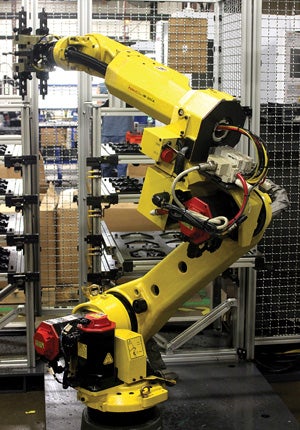Manufacturers struggle to find skilled workers
Published 12:54 am Wednesday, August 8, 2012

Daily Star photo/KATIE ROHMAN Paul Thomson, an operator at Vickers Engineering in New Troy, works on quality checks for Toyota Camry engine components.
Michigan Tool and Die in Benton Harbor had vacant toolmaker positions for 2 1/2 years.
With no new workers to fill the positions, employees were working overtime — some logging 65-hour weeks.
“I could’ve paid someone straight time,” President Steve Jackson said. “It creates stress on the existing workforce. You’re paying way more out on payroll.”
Training in the tool and die field includes an apprenticeship — his company picks up tuition based on academic grades — and then on-the-job training before obtaining a journeyman’s card.
“Nothing has really changed over the past 10 years, but it has really become more of a software-based trade,” Jackson said. “It used to be more of a craftsmanship. Now that we’re using CNCs (computer numerical control machinists), it’s a little more computer-oriented.”
The state unemployment rate may hover at about 8.6 percent, but there are many companies such as Michigan Tool and Die having difficulty filling positions due to lack of skilled workers.
Michigan Works is teaming up with Lake Michigan College to fill skill gaps manufacturers in Berrien, Cass and VanBuren counties are experiencing.
Corey Carolla, Michigan Works director of business and industry, said there are more than 60 unfilled CNC positions in the area.
Carolla said the position itself has changed over the years as technology progressed.
Rather than just “pushing a button,” a worker now must “be able to tell the machine to do what you want the machine to do,” he said.
‘We’re done complaining’
The Frederick S. Upton Foundation Associate Board is helping Michigan Works bridge fill this skills gap with a $30,000 grant for the nonprofit’s “Get SET (skills, education and training): Manufacturing” program. The initiative is aimed at training people who have worked previously or are currently working in manufacturing, but whose skills are outdated.
Carolla said many jobseekers have some — but not all — the skills to get them hired for these positions.
“We ask them how to take someone from the 30 percent-ready that you wouldn’t hire, to the 80 percent-ready that you might hire,” he said.
LMC established a curriculum based on manufacturers’ feedback.
Jackson said one problem in the tool and die industry is that instead of hiring newly trained workers, companies “steal” from competitors, which drives up costs because they are paying for experience.
“We are kind of a little bit cannibalistic,” he said. “We steal each other’s help, and that’s a really difficult situation to be in.”
Michigan Tool and Die — which is no longer hiring — pays as high as $30 per hour for the most experienced workers, while apprentices begin at about $12 per hour. The 35-year-old company employs 17.
Carolla said the standard pay range in the industry is $14 to $18.
“The big thing that we focus on is — the industry as a whole and me being a part of that before I came here — during the recession, we quit training people,” Carolla said. “We had to keep the people we had in place and working, and really quit focusing on big-picture future stuff.
“The bottom fell out from under us and we focused on the people we had,” he said.
Michigan Works has developed a similar program to fill certified nursing assistant needs, and it is beginning another to train welders. It is also targeting potential workers right out of high school — not just experienced workers — to explore manufacturing careers.
“I think it’s really important that the message gets across that this isn’t something that hasn’t really been dealt with,” Carolla said. “We’re not just sitting around griping about it. We’ve really stepped forward with a solution.
“We’re done complaining,” he said.
‘Our future is very bright’

Daily Star photo/KATIE ROHMAN This robot at Vickers Engineering assembles engine components for Toyota. “The technology is huge,” Vickers CEO Matt Tyler said.
Matt Tyler, CEO of Vickers Engineering Inc., a machining and fabrication company based in New Troy, Weesaw Township, located a second facility in Buchanan this year “with growth in mind.” Toyota is Vickers’ biggest customer, and it also contracts for oil and gas companies, the military and the agriculture industry.
Finding workers to facilitate that growth has been difficult.
“Our industry is very mature, and it’s considered on the street an old, industrial-type career set, so it carries with it a certain reputation … that makes it difficult for young people to gravitate toward metal manufacturing,” Tyler said.
“There aren’t as many big manufacturers in our area anymore, or really in the Midwest. We’re also not teaching it so much in our schools anymore. If we are, are we teaching what our companies actually need?”
Twenty years ago, Tyler said, machining was “80 percent brawn, 20 brain.” Now, the tables have turned.
“There’s robotics involved,” he said. “There’s a lot of sophisticated programs involved. It’s different than it used to be.”
In addition to providing in-house training, Vickers has worked with Niles New Tech Entrepreneurial Academy, Michigan Works and Lake Michigan College to give feedback and help develop interest and training for manufacturing careers.
“Our future is very bright, but we are actively working on how to find, train and develop a stable workforce,” Tyler said. “We’re changed our tune. Experience in a particular area is no longer a requirement.
We truly look for aptitude, teamwork and a willingness to work.
“We’re really excited that groups like LMC and Niles High School are reaching out,” Tyler said. “We’re really encouraged we’re not the only one who sees the problem.”
Michigan Works has service centers in Dowagiac, Benton Harbor and Paw Paw. For more information about job seeking or training, visit miworks.org or call (800) 533-5800.






